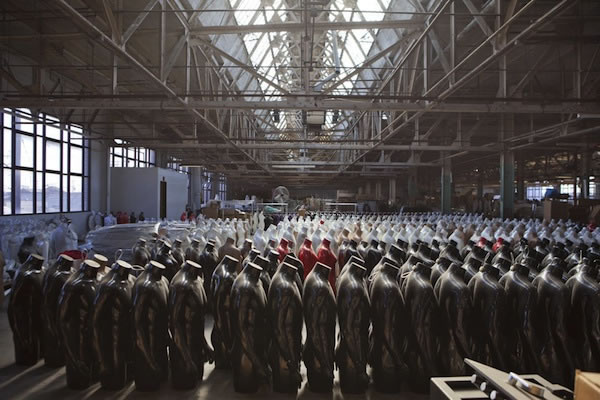by Costas Douzinas / Critical Legal Thinking, 31 May 2013
Rights form the terrain on which people are distributed into rulers, ruled, and excluded. Power’s mode of operation is revealed, if we observe which people are given or deprived of which rights at which particular place or point in time. In this sense, human rights both conceal and affirm the dominant structure of a period and help combat it. Marx was the first to realize the paradoxical nature of rights. Natural rights emerged as a symbol of universal emancipation, but they were at the same time a powerful weapon in the hands of the rising capitalist class, securing and naturalizing emerging dominant economic and social relations. They were used to take out of political challenge the central institutions of capitalism such as religion, property, contractual relations and the family, thus providing the best protection possible. Ideologies, private interests, and egotistical concerns appear natural, normal, and for the public good when they are glossed over by rights vocabulary. As Marx inimitably put it, “freedom, equality, property and Bentham.”1
Early human rights were historical victories of groups and individuals against state power while at the same time promoting a new type of domination. As Giorgio Agamben argues, they “simultaneously prepared a tacit but increasing inscription of individuals’ lives within the state order, thus offering a new and more dreadful foundation for the very sovereign power from which they wanted to liberate themselves.”2 In late capitalism, with its proliferating biopolitical regulation, the endlessly multiplying rights paradoxically increase power’s investment on bodies.
If classical natural rights protected property and religion by making them ‘apolitical’, the main effect of rights today is to depoliticize politics itself. Let us introduce a key distinction in recent political philosophy between politics (la politique) and the political (le politique). According to Chantal Mouffe, politics is the terrain of routine political life, the activity of debating, lobbying, and horse-trading that takes places around Westminster and Capitol Hill.3 The ‘political,’ on the other hand, refers to the way in which the social bond is instituted and concerns deep rifts in society. The political is the expression and articulation of the irreducibility of social conflict. Politics organizes the practices and institutions through which order is created, normalizing social co-existence in the context of conflict provided by the political.
This deep antagonism is the result of the tension between the structured social body, where every group has its role, function, and place, and what Jacques Rancière calls “the part of no part.” Groups that have been radically excluded from the social order; they are invisible, outside the established sense of what exists and is acceptable. Politics proper erupts only when an excluded part demands to be included and must change the rules of inclusion to achieve that. When they succeed, a new political subject is constituted, in excess to the hierarchized and visible group of groups and a division is put in the pre-existing common sense.4
What is the role of human rights in this division between politics and the political? Right claims reinforce rather than challenge established arrangements. The claimant accepts the established power and distribution orders and transforms the political claim into a demand for admission to the law. The role of law is to transform social and political tensions into a set of solvable problems regulated by rules and hand them over to rule experts. The rights claimant is the opposite of the revolutionaries of the early declarations, whose task was to change the overall design of the law. To this extent, his actions abandon the original commitment of rights to resist and oppose oppression and domination. The ‘excessive’ subjects, who stand for the universal from a position of exclusion, have been replaced by social and identity groups seeking recognition and limited redistribution.
In the new world order the right-claims of the excluded are foreclosed by political, legal, and military means. Economic migrants, refugees, prisoners of the war on terror, the sans papiers, inhabitants of African camps, these ‘one use humans’ are the indispensable precondition of human rights but, at the same time, they are the living, or rather dying, proof of their impossibility. Successful human rights struggles have undoubtedly improved the lives of people by marginal rearrangements of social hierarchies and non-threatening redistributions of the social product. But their effect is to depoliticize conflict and remove the possibility of radical change.
We can conclude that human rights claims and struggles bring to the surface the exclusion, domination and exploitation, and inescapable strife that permeates social and political life. But, at the same time, they conceal the deep roots of strife and domination by framing struggle and resistance in the terms of legal and individual remedies which, if successful, lead to small individual improvements and a marginal rearrangement of the social edifice.
Can human rights reactivate a politics of resistance? The intrinsic link between early natural rights, (religious) transcendence, and political radicalism opened the possibility. It is still active in parts of the world not fully incorporated in the biopolitical operations of power. But only just. The metaphysics of the age is that of the deconstruction of essence and meaning, the closing of the divide between ideal and real, the subjection of the universal to the dominant particular. Economic globalization and semiotic monolingualism are carrying this task out in practice; its intellectual apologists do it in theory. The political and moral duty of the critic is to keep the rift open and to discover and fight for transcendence in immanence.
- Karl Marx, Capital, Volume One (Harmondsworth: Penguin, 1976), 280.
- Giorgio Agamben, Homo Sacer: Sovereign Power and Bare Life (Stanford University Press, 1998), 121.
- Chantal Mouffe, On the Political (London: Routledge, 2005), 8–9.
- Jacques Rancière, Disagreement. trans. Julie Rose (Minneapolis: University of Minnesota Press, 1998); “Who is the Subject of the Rights of Man?” in “And Justice for All?” Ian Balfour and Eduardo Cadava, special issue, eds., South Atlantic Quarterly, 103, no. 2–3 (2004), 297.






